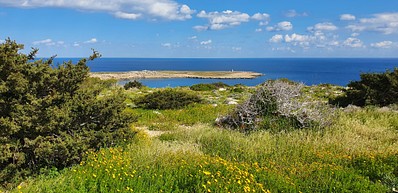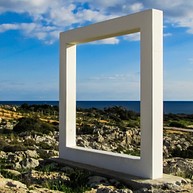
-
![Ayia Napa Aqueduct]() Provided by: Visit Famagusta
Provided by: Visit Famagusta

Our travel guides are free to read and explore online. If you want to get your own copy, the full travel guide for this destination is available to you offline* to bring along anywhere or print for your trip.
*this will be downloaded as a PDF.Price
€4,95
Agia Napa Aqueduct
The guide was updated:One of the most important monuments preserved within the boundaries of the Agia Napa municipality. The Aqueduct supplied the monastery and the whole region with water for hundreds of years. The monument in its present state of preservation is an alteration of the original Roman aqueduct, occurred during the Frankish period when the monastery was built. The source of the water is to be found somewhere on the Northeastern hills of Agia Napa. Up to the year 1974 the original visible route of the channel was marked by a barrel-shaped structure at the locality of ‘Mana tou Nerou’, known traditionally as the House of the Greeks. From that point the aqueduct ran all the way to the monastery following the natural contours of the bedrock.
Useful Information
- Address: Kryou Nerou Street, Agia Napa
Digital Travel Guide Download
Our travel guides are free to read and explore online. If you want to get your own copy, the full travel guide for this destination is available to you offline* to bring along anywhere or print for your trip.
*this will be downloaded as a PDF.Price
€4,95

Explore the multitude of intriguing nature trails lined with pine trees and a diverse botanical splendour whilst pausing to take in the spectacular views from the sea cliffs looking down to the beautiful Mediterranean Sea. Many benches are spread out along these trails to take a break from the walk and admire the surroundings in stillness. One of these nature trails forms part of the European Long Distance Trail E4, running from Cyprus to Gibraltar. Then there’s the Aphrodite nature trail which stretches 2 km along the North-East coast of Cape Greco which doubles up as a Cultural Route due to the mythical birthplace of Aphrodite. A lovely monument to visit is the tiny white washed church of Agoi Anargyroi, with steps that lead down to the sea where there is a place where Holy water runs. Another trail leads to the ‘Cyclops’ cave where there is a picnic site close by.
Cycle paths are strewn throughout. Cyprus has the ideal climate for cycling all year round with low annual rainfall and light winds. Nine–metre high limestone cliffs have caves which have been hewn by Mother Nature. Taking a boat trip along the coast you will see that they are really striking, which is why they have been aptly named the ‘Palaces’. Cape Greco has warm sea temperatures ranging from 16 to 28 degrees and visibility reaching up to 40 metres. For this reason, as well as for the wonderful scenery and the marine life, this area is very popular with divers.
Read more

Thalassa Agia Napa Municipal Museum
Thalassa explores Cyprus' seafaring history and marine life. The exhibits cover a chronological span, from pale ontological and prehistoric periods until present times. See an exact life size replica of the ancient ship of Kyrenia of the Classical period (400 BC), the replica of a Mesolithic (9200 BC) papyrus vessel, a traditional Cypriot boat from 19th century, known as “Passara”, Cypriot antiquities, bones and skulls of endemic pygmy hippopotamus and elephants of Cyprus (8000 years old), and fossilized exhibits such as sea-urchins and corals. Moreover, learn about stuffed fishes, mammals, sea turtles and marine organisms, such as shells, barnacles, corals, sea-urchins, starfish, crabs, lobsters, sponges, marine plants and more found in various parts of the island.
Read more

Agia Napa Monastery
A landmark in the heart of Agia Napa, the Monastery is the most important sight in town. It is easily accessible to all visitors, as it is located in the central square, about two kilometres away from the Harbour. Among some of the well known visitors of the monastery was the Greek Nobel laureate Giorgos Seferis, who was astounded by the beauty he faced when he visited the place. He decided to dedicate a hymn to the Monastery, and thus wrote the poem "Agia Napa B" which can be found in his collection of poems “Emerologio Katastromatos C” (Logbook III).
There is an uncertainty as to when the Monastery was initially built. The cave, the hiding place and the well, witness the presence of a Christian community there since the Byzantine years (11th century). The first element of the temple (13th–14th century) was built during the Frankish period, while the rest of the Monastery was completed during the 15th century. However, the Monastery as it stands nowadays is a construction of the 15th century, a time during which Cyprus was under the Venetian regime.
Read more

Bridge of Lovers
The natural rock structure is located just south of the Sculpture Park. The crystal clear waters of the Cape Greco sea shore are amazing. They seem to be like blue mirrors reflecting the sun's light and they provide the perfect backdrop for photos.
Read more

Agia Napa Harbour
The picturesque Agia Napa Harbour is undoubtedly one of the main features of the town, after the Medieval Monastery and Cape Greco. The harbour is equiped with pedestrian lanes which lead to the two lighthouses. Colourful and typically picturesque, the area around the harbour includes an open theatre, fountains, quaint cafes, fish taverns and restaurants. The ambiance around the harbour is a real ornament and it is rightfully classified among the most contemporary and picturesque harbours in Cyprus.
Many decades ago, the harbour was just a small bay with a few fishing boats. In the beginning of the 70s, the first breakwater was constructed which basically marked the beginning of the current development of the harbour. Nowadays, the Harbour is fully renovated with a large fleet of fishing boats, speed boats, sailboats and cruise ships.
Read more

Agia Napa Aqueduct
One of the most important monuments preserved within the boundaries of the Agia Napa municipality. The Aqueduct supplied the monastery and the whole region with water for hundreds of years. The monument in its present state of preservation is an alteration of the original Roman aqueduct, occurred during the Frankish period when the monastery was built. The source of the water is to be found somewhere on the Northeastern hills of Agia Napa. Up to the year 1974 the original visible route of the channel was marked by a barrel-shaped structure at the locality of ‘Mana tou Nerou’, known traditionally as the House of the Greeks. From that point the aqueduct ran all the way to the monastery following the natural contours of the bedrock.
Read more

Makronissos Ancient Tombs
The Makronisos cemetery includes 19 Hellenistic and Roman tombs (2400 BC). The entrances were originally closed with one large or two smaller calcarenite slabs. Among the findings at the site are clay sarcophagi which were originally covered with three flat tiles and a limestone Kore statuette, both displayed in the Thalassa Municipal Museum.
Read more

Sea Caves
The Sea Caves or “Palatia” are certainly one of the main features of Agia Napa and the centre of attraction for thousands of locals and tourists. Found between Kermia Beach and the Cavo Greco Cape, they have a tremendous geological history and are of social, environmental and economic importance to Agia Napa.
A visit to the sea caves is a must for an enjoyable walk and a close view of the captivating scenery, designed by nature and time, and a dive into the crystal waters of the sea is a treat.
Read more

WaterWorld Themed Waterpark Agia Napa
The award-winning Agia Napa Waterpark is one of the twelve best water parks worldwide, according to reliable sources of the American Television Network CNN. It is located on Agia Theklis Street, on the west entrance of Agia Napa.
The Waterpark has the ancient Greek mythology theme. Ancient Greek characters of the water park are depicted in a simplistic yet evocative way throughout the water slides and the recreation areas of the park, including the plethora of games found in all entertainment venues, such as the Fish Spa and the Go Karts.
Read more

Sculpture Park
The Sculpture Park is found on the crossroad of Cavo Greco Avenue and Kryou Nerou, in an 20,000 sq.m. area with unbelievable natural beauty and panoramic views. The contemporary art pieces depict mythical beasts and ancient gods, with sea views as the background.
The park is adorned with sculptures created by many world-renowned artists who participate in the Sculpture Symposium which is organized every year by the Agia Napa Municipality.
Read more

I Love Ayia Napa Sculpture
Visit the stone sculpture “I Love Ayia Napa” at the central square of the town and leave your photo in between the sculpture, to express your love for Agia Napa in this way. The sculpture is placed at the Monastery Central Square and was created by the sculptor Yianni Yianni.
Read more

Agioi Anargyroi Chapel
The chapel is found on the Eastern side of the town and is devoted to Agios Kosmas and Agios Damianos, or the Omosianoi Saints as they called them, both doctors who treated and cured patients without receiving any payment. According to legend, during their journeys in the area, they faced rough seas and their boat was carried away into a cave which has since been turned into a chapel. At a later stage, the new chapel was built on the rock right above the cave.
The Saints’ blessed water “Agiasma” is found in the cave under the rock. Church services are held on the 1st of July and the 1st of November.
Read more

Kamara Tou Koraka Stone Arch or "Love Bridge"
On the way to Agioi Anargyroi chapel, on the right side, you’ll find “Kamara Tou Koraka” — an impressive geological formation which looks like a bridge or an arch.
Read more


